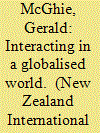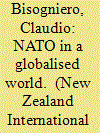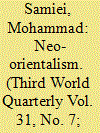| Srl | Item |
| 1 |
ID:
128804


|
|
|
| 2 |
ID:
092455


|
|
|
|
|
| Publication |
2009.
|
| Summary/Abstract |
This article argues that there are five major challenges currently facing Western intelligence communities. First - ensuring skills retention for intelligence officers and analysts, while developing knowledgeable managers and customers, all in an increasingly-complex security environment. Second - instituting and inculcating knowledge and expertise in these staff - while addressing an opponent in al-Qaeda which demonstrates increasingly sophisticated use of IT, new media, etc. Third - drawing-in outside expertise from the research and business communities, as is done currently in the US and Canada but in only a very limited manner in the UK. Fourth - overcoming institutional rigidity in dividing the foreign and domestic - alongside rigid sharing and co-operation relationships. Fifth - creating truly collaborative environments that offer genuine socio-cultural incentives to collaboration rather than mere 'IT solutions'.
|
|
|
|
|
|
|
|
|
|
|
|
|
|
|
|
| 3 |
ID:
104787


|
|
|
| 4 |
ID:
100325


|
|
|
|
|
| Publication |
2010.
|
| Summary/Abstract |
Orientalism, as Edward Said used the term, can be defined as an ideology which promotes the 'West-and-Islam' dualism and the idea that 'Others are less human'. Since Said first published his ideas in 1978, however, the world seems to have become much more interdependent and political interrelations between the West and Islam have changed dramatically. Consequently this dualism, though more or less in place, has been influenced by escalating waves of globalisation and redistributed and reshaped in a different form. Some promising changes, as well as some additional dualistic tendencies, that can define neo-Orientalism are found in this new era. This paper attempts to analyse elements of change in traditional Orientalism. To portray a better future for our interdependent world some new approaches to identity, global ethics and global civil society are suggested. Eradicating the roots of Orientalism and Occidentalism alike and accepting, protecting and even promoting diversity are first steps towards countering the devastating threats that endanger humankind as a whole.
|
|
|
|
|
|
|
|
|
|
|
|
|
|
|
|
| 5 |
ID:
180494


|
|
|
|
|
| Summary/Abstract |
After the collapse of the USSR, the successor states faced a single but contradictory challenge: the need to adapt to general rules of globalisation and simultaneously preserve their nation’s uniqueness. It is under these circumstances that some former Soviet citizens have developed a stronger attachment to their national identity. This original study employs a multilevel approach relying on survey data to analyse how a former Soviet republic’s level of globalisation is related to its citizens’ national identity. The results reveal the potential for future cultural wars between the winners and losers of globalisation within the post-Soviet space.
|
|
|
|
|
|
|
|
|
|
|
|
|
|
|
|